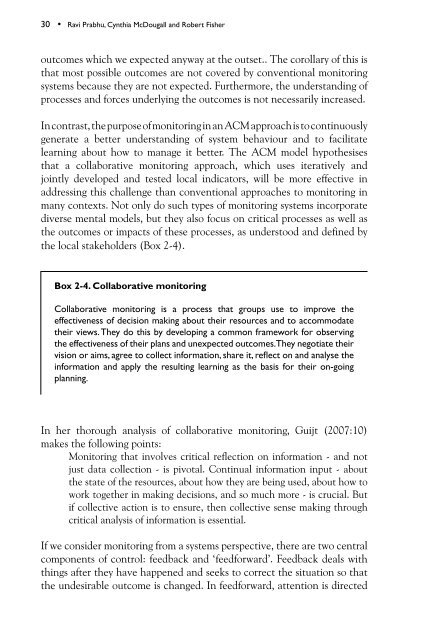Adaptive collaborative management of community forests in Asia ...
Adaptive collaborative management of community forests in Asia ...
Adaptive collaborative management of community forests in Asia ...
You also want an ePaper? Increase the reach of your titles
YUMPU automatically turns print PDFs into web optimized ePapers that Google loves.
30 • Ravi Prabhu, Cynthia McDougall and Robert Fisher<br />
outcomes which we expected anyway at the outset.. The corollary <strong>of</strong> this is<br />
that most possible outcomes are not covered by conventional monitor<strong>in</strong>g<br />
systems because they are not expected. Furthermore, the understand<strong>in</strong>g <strong>of</strong><br />
processes and forces underly<strong>in</strong>g the outcomes is not necessarily <strong>in</strong>creased.<br />
In contrast, the purpose <strong>of</strong> monitor<strong>in</strong>g <strong>in</strong> an ACM approach is to cont<strong>in</strong>uously<br />
generate a better understand<strong>in</strong>g <strong>of</strong> system behaviour and to facilitate<br />
learn<strong>in</strong>g about how to manage it better. The ACM model hypothesises<br />
that a <strong>collaborative</strong> monitor<strong>in</strong>g approach, which uses iteratively and<br />
jo<strong>in</strong>tly developed and tested local <strong>in</strong>dicators, will be more effective <strong>in</strong><br />
address<strong>in</strong>g this challenge than conventional approaches to monitor<strong>in</strong>g <strong>in</strong><br />
many contexts. Not only do such types <strong>of</strong> monitor<strong>in</strong>g systems <strong>in</strong>corporate<br />
diverse mental models, but they also focus on critical processes as well as<br />
the outcomes or impacts <strong>of</strong> these processes, as understood and def<strong>in</strong>ed by<br />
the local stakeholders (Box 2-4).<br />
Box 2-4. Collaborative monitor<strong>in</strong>g<br />
Collaborative monitor<strong>in</strong>g is a process that groups use to improve the<br />
effectiveness <strong>of</strong> decision mak<strong>in</strong>g about their resources and to accommodate<br />
their views. They do this by develop<strong>in</strong>g a common framework for observ<strong>in</strong>g<br />
the effectiveness <strong>of</strong> their plans and unexpected outcomes. They negotiate their<br />
vision or aims, agree to collect <strong>in</strong>formation, share it, reflect on and analyse the<br />
<strong>in</strong>formation and apply the result<strong>in</strong>g learn<strong>in</strong>g as the basis for their on-go<strong>in</strong>g<br />
plann<strong>in</strong>g.<br />
In her thorough analysis <strong>of</strong> <strong>collaborative</strong> monitor<strong>in</strong>g, Guijt (2007:10)<br />
makes the follow<strong>in</strong>g po<strong>in</strong>ts:<br />
Monitor<strong>in</strong>g that <strong>in</strong>volves critical reflection on <strong>in</strong>formation - and not<br />
just data collection - is pivotal. Cont<strong>in</strong>ual <strong>in</strong>formation <strong>in</strong>put - about<br />
the state <strong>of</strong> the resources, about how they are be<strong>in</strong>g used, about how to<br />
work together <strong>in</strong> mak<strong>in</strong>g decisions, and so much more - is crucial. But<br />
if collective action is to ensure, then collective sense mak<strong>in</strong>g through<br />
critical analysis <strong>of</strong> <strong>in</strong>formation is essential.<br />
If we consider monitor<strong>in</strong>g from a systems perspective, there are two central<br />
components <strong>of</strong> control: feedback and ‘feedforward’. Feedback deals with<br />
th<strong>in</strong>gs after they have happened and seeks to correct the situation so that<br />
the undesirable outcome is changed. In feedforward, attention is directed
















